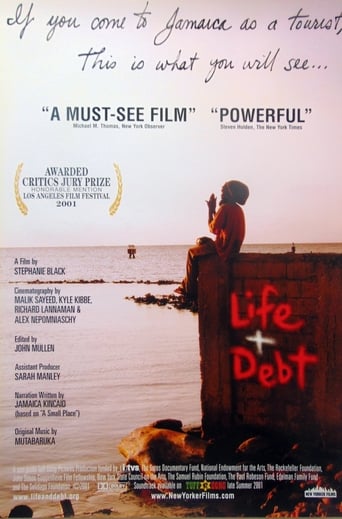

As a development worker in Jamaica, I can say that there is a lot of painful accuracy in the movie. Yes, tourists do act that badly, almost unanimously if you only count the ones who spend their time here locked away in a guarded resort. And now over half of ever tax dollar goes to paying foreign debt...
... View More"Life and Debt" documents the extremely negative effects "globalization" has on the Jamaican economny and agriculture. Juxtaposing typical tourist views with searingly challenging economic conditions of Jamaican natives, the audience begins to see a side of this culture normally hidden away. Hearing representatives from the International Monetary Fund and World Bank talk, one recognizes the familiar rhetoric--administrative jargon which obscures its callous action: look out for one's self first and foremost.Well-known US companies are documented here as part of the problem. Their motivation is to make a profit, period, no matter at what cost or human price. American stockholders tend here to look at and be primarily concerned with how many points their shares rise--"Life and Debt" shows the downside of that rise. There's a lot more to life than merely being concerned about one's self. This film cries out for us to hear the needy call of our planetary brother and sister. Capitalism and competition tend to be cold animals--and one buys into those concepts because they're in place and operating . . . never stopping to think that there may be an exploitative side to these activities.Stephanie Black captures that side in this documentary. The tourists are rightly there to have a good time, yet we cannot turn our backs on our neighbors. Imposing grossly high interest rates and stipulations that cause them to sink greater into debt each year is not aiding them. Unloosing our subsidized powered milk on their marketplace while their unsold whole milk must be poured down the drain is not being fair.When rioters and demonstrators took to the streets there and in the US against globalization, I wondered what it was all about. "Life and Debt" helped provide a subsantive explanation. The film is not an entertainment: it is a serious, thought-provoking film to inform. As I sat in a near-empty movie house, with some people leaving before the end of the film, I wondered where was the audience? I thought, are we not all involved in this scenario? When we buy items "assembled in" Jamaica, do we really realize what that means in terms of "free zone?"When we delight in paying very low prices for items made in China, Japan, Mexico, and the like, how does that really impact upon those countries' workers? "Life and Debt" helps provide an answer. I very much value this documentary, and look forward to obtaining the dvd when released, to further ponder world economic check and balances and rethink the entire concept of "globalization."
... View MoreI am actually waiting for this movie to become available on VHS. It would tie in perfectly with what I teach in my political economy class.The movie clearly explains how rich countries can dominate poorer ones. It also causes one to re-think capitalism, competition and the "invisible hand."
... View MoreThis is a really tragic and shattering film. I saw it a few days ago in New York at a lower East side cinema. It is a very honest and yet artistically distinguished portrait of the demise of a Caribbean nation - Jamaica. Interspersed with the cold, hard facts of how the international community has loaned the country money at predatory interest rates, and then dumped products on Jamaica's undeveloped markets, thus destroying native industries, are scenes of tourists enjoying Jamaica's bounties, oblivious to the nature of the natives' distress.The woman who made this film narrates it herself, and she wrote a book on the subject before she made this film. So her credentials for knowledge about the subject are very strong. She employs a few cinematic flourishes, such as the blurred-edge-of-screen effect when she shows poor Jamaicans digging about in a garbage dump. The soundtrack is replete with great reggae songs, including the potent and topical title track.Basically, this film is more important in its 90 minutes than about a hundred typically vapid Hollywood productions stacked back to back. This film teaches you something about the world - about the exploitation of the weak, about the myth of the "helping" nature of the IMF and the World Bank, and about the everyday lives of desperately poor third world people. All proponents of "globalization" should see this film, and then be required to defend their views to the people who have been victimized by globalization's cruel and relentless march. Similarly, everyone who works for the major media in the US should see this, and should be ashamed of themselves for defending the policies that have contributed to the downfall of a proud and beautiful people such as those of Jamaica. And silence is the major defense employed on behalf of such policies.
... View More